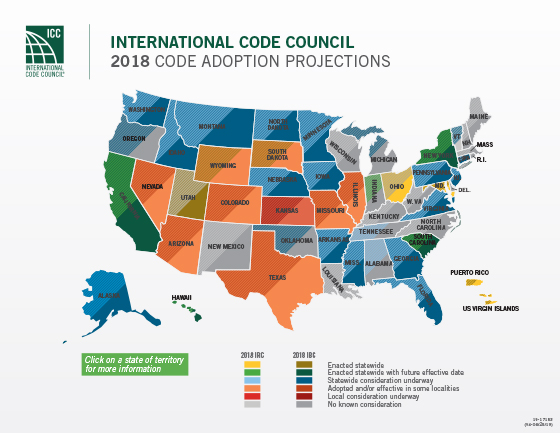Government Relations Forum
Tuesday, Oct. 22, 2019, 8:30 – 11:30 am
Participants will receive CEUs for this Session.
The Code Council’s Government Relations Forum features an impressive line-up of speakers covering current topics and emerging trends across the country. View the agenda and check out our speakers below.
More information about....
No Code. No Confidence.
The Federal Alliance for Safe Homes (FLASH) champions the "No Code. No Confidence." building code campaign. The campaign was launched during the 2019 National Hurricane Conference. This data driven community outreach project will increase safety and resilience. Click the link above to learn more, and to identify the codes used in your community!
More information about....
Up to Date Building Codes Mitigate Risk
Mitigation Saves
Building codes represent a highly cost-effective strategy to help protect communities from the risks posed by natural disasters. The Congressionally established National Institute of Building Sciences (NIBS) found that adopting and enforcing the 2018 International Building Code (IBC) and International Residential Code (IRC) provides communities with $11 in mitigation benefit for every $1 invested. The study can be found here. A video summary of the NIBS report, and a map detailing state progress towards the 2018 I-Codes are included below. Check out ICC's "Codes Save" page for additional resources.
View Codes Save video above.
Additional Research
A number of studies demonstrate the value of up to date building codes as mitigation measures against natural hazards and the cost effectiveness of these efforts. One study found buyers paid an almost 6 percent premium for homes with hurricane shutters on Galveston Island, TX. Another study found resale premiums near 4 percent for homes with tornado shelters. Additional research has found that enacting enhanced codes in tornado country had no effect on the price per square foot or home sales.
More information about....
The State of Code Adoption and Application
View the Building Code Effectiveness Grading Schedule (BCEGS) National Building Code Assessment Report here for an in depth analysis of state code enforcement efforts.
More information about....
Federal Support for Leveraging Codes in Promoting Resilient Communities
On August 14, 2019 the Mitigation Framework Leadership Group (MitFLG), chaired by the Federal Emergency Management Agency (FEMA), released the National Mitigation Investment Strategy (NMIS), a unified national strategy on mitigation investment that reduces risks posed by natural hazards and increases the nation’s resilience to disasters. The MitFLG is composed of 14 federal agencies and departments as well as state, tribal and local officials and is charged with coordinating the strategy’s implementation. The NMIS devotes a section to encouraging communities to adopt and enforce up-to-date building codes. The strategy’s focus on codes as a keystone mitigation investment strategy aligns with FEMA’s current strategic plan, and highlights that up-to-date building codes help communities survive, remain resilient, and continue to provide essential services after a disaster occurs. The NMIS notes that despite extensive research on codes’ mitigation benefits, only 32 percent of disaster-prone jurisdictions have adopted disaster-resistant building codes.
One of the most critical recommendations in the strategy with immediate implications is “Up-to-date building codes and standard criteria should be required in federal and state grants and programs.” To the Code Council’s knowledge, FEMA is currently the only federal agency that requires adherence to the latest codes and standards in a grant program. This recommendation has widespread existing support, including from bipartisan former FEMA administrators. It also builds on recent work by the Administration and Congress to leverage codes’ mitigation benefits. Twice last year – through the Bipartisan Budget Act and Disaster Recovery Reform Act – Congress passed, and the President signed into law, measures that incentivize the adoption and application of modern model building codes through enhanced federal cost shares for post-disaster rebuilding, new grants for states and localities both pre- and post-disaster, and by making pre-disaster mitigation grant applicants more competitive based on their adoption of up to date model codes.
ICC’s summary of the Disaster Recovery Reform Act can be viewed here.
More information about....
Chicago Adoption of the I-Codes
The city of Chicago voted on April 10th, 2019 to adopt a major update to the Chicago Building Code, adopting the 2018 International Building Code and the 2018 International Existing Building Code. The new codes represents the first comprehensive revisions to the Chicago building code in 70 years and will make construction in Chicago more affordable by expanding options to design and build with a wider range of materials and technologies. Though there have been several modifications to the Chicago Building Code over the years, the last comprehensive overhaul to the code was adopted in 1949. The code update approved by City Council moves Chicago closer to national standards in several significant areas, including building planning, fire and life safety, enclosures and materials, structural, small residential, and rehabilitation of existing buildings. Click the links below for more information!
City of Chicago Press Release – City of Chicago
City of Chicago Approves Major Building Code Modernization – Building Safety Journal
Chicago Modernizes Building Codes – Building Safety Journal
Chicago Takes Next Step to Modernize its Building Code using the I-Codes – Building Safety Journal
More information about....
The Alliance for National and Community Resilience
The Alliance for National & Community Resilience (ANCR), founded by the International Code Council, U.S. Resiliency Council and the Meridian Institute, is a coalition of public and private sector stakeholders working to advance community resilience. ANCR has identified 19 community functions that define a resilient community. Community resilience relies on a holistic vision that identifies and acts on the important functions that lead to community resilience. These functions span the social, infrastructural and organizational aspects of communities. ANCR’s primary objective is the development of a system of community benchmarks—the first system of its kind in the United States—that will allow local leaders to easily assess and improve their resilience across all functions of a community. To assist communities in determining their current state of resilience and to help identify strategies to improve their resilience, ANCR is developing benchmarks for each of the 19 functional areas. ANCR will provide communities with a voluntary, transparent, usable, and easily understandable tool that helps to showcase their whole community resilience and to provide a roadmap for improving their resilience.
View video about Alliance for National & Community Resilience above.
More information about....
Energy Efficiency and the Code Council
As communities look to achieve goals around energy performance or greenhouse gas emissions, the International Energy Conservation Code (IECC) and the International Green Construction Code (IgCC) provide solutions. Additionally, the Sustainability Membership Committee is bringing together leaders to identify how ICC can support communities that have adopted aggressive policies to advance the energy performance of buildings.








 Ryan Colker,
Ryan Colker, 
